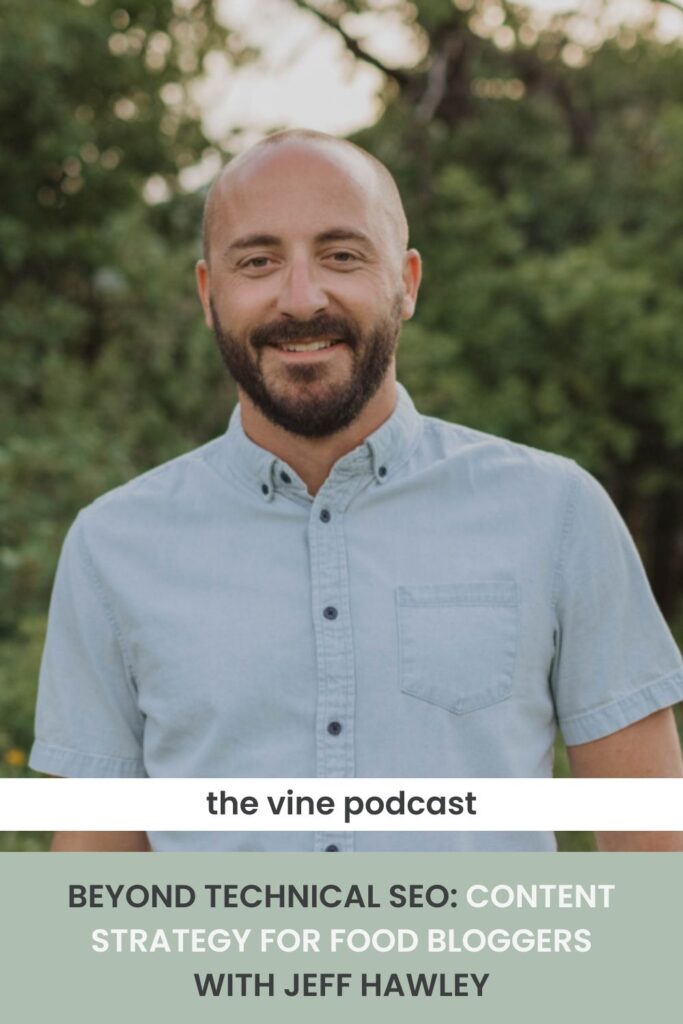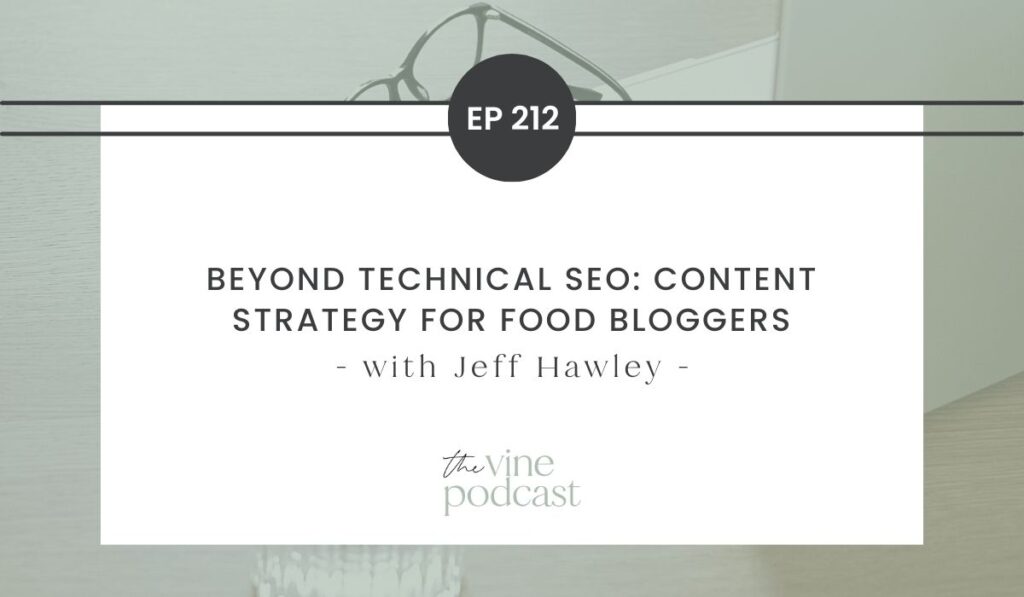Are you tired of chasing SEO trends and algorithm updates without seeing sustainable growth? As food bloggers, we often get caught up in technical SEO tweaks and site speed optimizations, but what if there’s a more holistic approach that could lead to long-term success?
In this insightful conversation with SEO expert Jeff Hawley, we explore why the most successful food bloggers are shifting from purely technical SEO tactics to a more comprehensive content strategy focused on building topical authority and creating a memorable brand. Let’s dive into how this approach can transform your blog from just another recipe site to a trusted authority in your niche!


Why Traditional SEO Advice Falls Short for Food Bloggers
The food blogging landscape has changed dramatically. Unlike the early days when sites like Simply Recipes could succeed by covering every recipe type, today’s environment is incredibly competitive. With thousands of food blogs launching every year, following generic SEO advice isn’t enough to stand out.
“The reality is that you have to have a brand. You have to have an audience in order to have success with the content that you’re creating,” explains Jeff.
The problem with much of the SEO advice circulating in the food blogging community is that it’s:
- Too tactical and short-sighted
- Focused on temporary wins rather than sustainable growth
- Often disconnected from your specific audience and brand goals
- Treats all food blogs the same despite different niches and audiences
Building a Long-Term Brand Strategy (Not Just Content)
The foundation of SEO success isn’t about keyword research tools or technical optimizations—it starts with a clear vision of your brand’s future. This means thinking beyond the next viral recipe trend and asking: “What do I want my blog to be known for in the long run?”
Jeff emphasizes that many bloggers get caught in what he calls the “emotional decision trap” by:
- Chasing trends without considering if they align with their brand
- Getting bored with content that’s working and pivoting too frequently
- Comparing themselves to competitors and copying their strategies
- Not recognizing or doubling down on what’s already working
Instead of following this reactive approach, successful food bloggers are intentional about building a cohesive brand that resonates with a specific audience.
How to Apply This to Your Blog:
Ask yourself these critical questions:
- What topics am I genuinely good at and passionate about?
- What does my audience already know me for?
- Where have I seen success in traffic and engagement?
- What content could I consistently create for years without burning out?
This isn’t just about picking a niche—it’s about building a foundation that can weather algorithm changes and industry shifts.
The 75/25 Rule for Content Planning
One of the most practical takeaways from our conversation is what Jeff calls the “75/25 rule” for content planning. Rather than trying to cover everything related to food, focus:
- 75% of your content on 3-5 core topic areas where you want to build authority
- 25% of your content on other topics that interest you or your audience
“The reason for this recommendation is purely because we are in a very competitive space,” Jeff explains. “If we don’t focus, then it’s going to be much harder for us to build momentum or really grow.”
This approach helps you build topical authority while still maintaining creative freedom. It also makes your site more memorable—if someone can’t explain to a friend what your blog is about, you’re probably spread too thin.
Finding Your Sweet Spot Topics
When identifying your core topics, aim for areas that are:
- Not too broad (like “dinner” or “dessert”)
- Not too narrow (like “sourdough banana desserts”)
- Manageable enough that you could build substantial content within 1-2 years
- Connected to your existing successful content or expertise
- Aligned with your long-term brand vision
For example, instead of broadly covering “breakfast,” you might focus on “quick, healthy breakfast options for busy families” or “make-ahead breakfast recipes that support weight management.”

Building Topical Authority Through Strategic Content
Topical authority isn’t built overnight—it’s the result of consistently creating quality content around specific topics. Google recognizes sites that provide comprehensive coverage of a subject and rewards them with better rankings.
Jeff suggests this simple approach to building topical authority:
- Identify your core topics: Decide on 3-5 areas where you want to be known as an authority
- Audit your existing content: See what you already have that supports these topics
- Create a content plan: Fill gaps and strengthen your coverage in these areas
- Showcase your expertise: Make your authority topics visible in your site organization, navigation, and homepage
“As you make that decision and start to go that route, now you have to show it and lead people into that,” Jeff advises. Your site structure should clearly signal to visitors (and search engines) what topics you specialize in.
Balancing New Content vs. Updating Existing Posts
The dilemma of whether to create new content or update old posts is something every established blogger faces. Rather than following a fixed ratio, Jeff recommends thinking about both through the lens of opportunity:
“We need to look at the new content opportunities and the existing content opportunities, and just look at those as kind of one thing and then decide based on those topics, which topics are going to do best for me.”
When deciding what to update, consider:
- Seasonal relevance (prioritize content that will be in demand soon)
- Performance trends (posts that are declining in rankings may need attention)
- Alignment with your core topics (focus on strengthening your authority areas)
- Content quality (older posts that don’t meet your current standards)
Don’t feel pressured to update everything. Some content can remain as is, especially if it still fits your site’s theme but just isn’t a current priority.
Practical Tools for Implementing This Approach
While the holistic approach to SEO is more about strategy than tools, having the right resources can make implementation easier. Jeff recommends:
Essential Free Tools:
- Google Search Console
- Google Analytics
Paid Tools to Consider:
- For keyword research: Mangools (more affordable than comprehensive suites)
- For content planning: Content Harmony
- For content organization: Airtable or similar database tool
Jeff cautions against becoming too dependent on tools like SEMrush or Ahrefs, noting that constantly watching ranking fluctuations can become mentally draining and distracting.
Most importantly, he recommends creating a permanent organization system for your content so you can track ideas, opportunities, and performance over time—not just plan for the next few weeks.

Moving Forward: A Balanced Approach to SEO
The key takeaway from our conversation is that sustainable SEO success comes from balancing data with intuition, technical optimization with brand building, and short-term tactics with long-term strategy.
While technical SEO fundamentals are still important, they should support your content strategy—not drive it. By focusing on creating a cohesive body of content around topics you’re passionate about and your audience values, you build a site that can withstand algorithm updates and industry changes.
Remember that building topical authority is a marathon, not a sprint. It requires patience, consistency, and a willingness to stick with your core topics even when trending keywords tempt you to stray.
Your Action Plan
Building a successful food blog in today’s competitive landscape requires more than just following SEO tactics—it demands a holistic approach centered on your unique brand identity and audience needs.
To implement this strategy:
- Define your 3-5 core topics where you want to build authority
- Commit to the 75/25 rule for your content planning
- Regularly audit your content through the lens of your authority topics
- Make your topical focus visible in your site structure and navigation
- Balance creating new content with strengthening existing posts
- Track your content and performance in an organized system
By shifting from a purely technical approach to a more holistic content strategy, you’ll build a food blog that not only ranks well today but continues to thrive through whatever changes come tomorrow.
Related episodes:
EP 154: 5 Ways to Boost Your SEO This Year
EP 207: SEO Still Matters in 2025 with Carl Ross

Jeff Hawley is founder of HashtagJeff, where he and his team share a passion for developing tools to make SEO, digital content creation, and digital content management more successful for online publishers.

ready to take your food blog to the next level?
We work with food bloggers looking to stand out of the crowd through custom brand and website design.




Leave a Comment